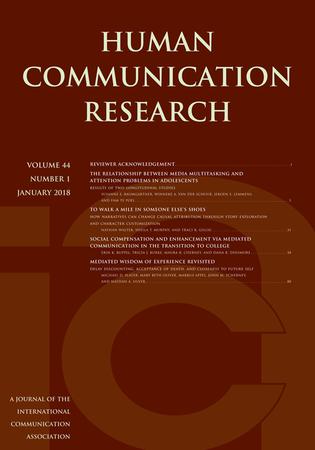人工智能和印象管理:自主对话代理代表某人进行交流的后果
IF 4.4
1区 文学
Q1 COMMUNICATION
引用次数: 0
摘要
具有高度会话流畅性的自主运行的人工智能通信技术(AICTs)可以代表其主要用户做出通信决策,并代表其与这些主要用户的受众进行通信。在本研究中,我们探讨了aict在沟通活动中的参与如何影响校长如何参与印象管理,以及他们的沟通伙伴如何形成对他们的印象。通过对两种人工智能调度技术的用户进行归纳、比较的实地研究,我们发现了三种交际实践,当人工智能技术代表他们进行交流时,委托人通过这些交际实践进行印象管理:口译、外交和表演礼貌。我们还揭示了沟通伙伴在通过aict与他们沟通时形成对委托人印象的三个过程:确认、转移和划分。我们表明,沟通伙伴可以将AICTs的印象转移给校长本人,并概述了这种转移可能发生和不可能发生的条件。我们讨论了这些发现对人工智能时代印象管理和形成的技术中介研究的影响,并提出了指导未来实证研究的建议。本文章由计算机程序翻译,如有差异,请以英文原文为准。
Artificial Intelligence and Impression Management: Consequences of Autonomous Conversational Agents Communicating on One’s Behalf
Artificially intelligent communication technologies (AICTs) that operate autonomously with high degrees of conversational fluency can make communication decisions on behalf of their principal users and communicate with those principals’ audiences on their behalf. In this study, we explore how the involvement of AICTs in communication activities shapes how principals engage in impression management and how their communication partners form impressions of them. Through an inductive, comparative field study of users of two AI scheduling technologies, we uncover three communicative practices through which principals engaged in impression management when AICTs communicate on their behalf: interpretation, diplomacy, and staging politeness. We also uncover three processes through which communication partners formed impressions of principals when communicating with them via AICTs: confirmation, transference, and compartmentalization. We show that communication partners can transfer impressions of AICTs to principals themselves and outline the conditions under which such transference is and is not likely. We discuss the implications of these findings for the study of technological mediation of impression management and formation in the age of artificial intelligence and present propositions to guide future empirical research.
求助全文
通过发布文献求助,成功后即可免费获取论文全文。
去求助
来源期刊

Human Communication Research
COMMUNICATION-
CiteScore
8.20
自引率
2.00%
发文量
28
期刊介绍:
Human Communication Research is one of the official journals of the prestigious International Communication Association and concentrates on presenting the best empirical work in the area of human communication. It is a top-ranked communication studies journal and one of the top ten journals in the field of human communication. Major topic areas for the journal include language and social interaction, nonverbal communication, interpersonal communication, organizational communication and new technologies, mass communication, health communication, intercultural communication, and developmental issues in communication.
 求助内容:
求助内容: 应助结果提醒方式:
应助结果提醒方式:


